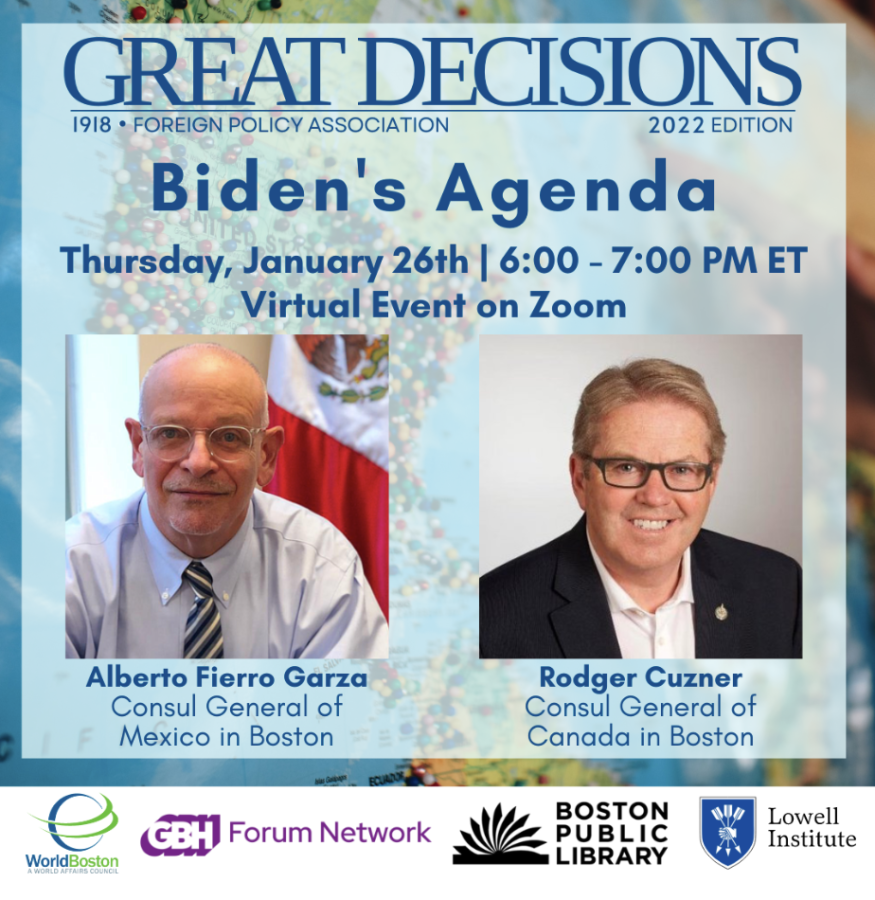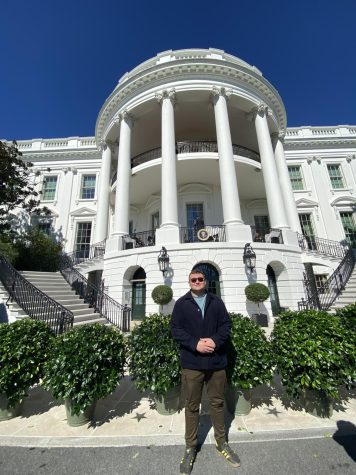WorldBoston panel on US/MEX/CAN relationship
Promotional poster for latest WorldBoston event “Great Decisions” on Thursday evening.
January 27, 2023
The latest WorldBoston event showed that America’s geographically closest allies have a quiet confidence in its foreign policy agenda.
WorldBoston is a global affairs counsel and has been a convener on international topics at the intersection of the relationship between Boston and the world for decades.“Great Decisions: Biden’s Agenda,” a discussion of foreign policy and North American relations, was the latest in their speaker series and featured Rodger Cuzner, consul general of Canada in Boston, and Alberto Fierro Garza, consul general of Mexico in Boston. The virtual event took place on Thursday evening and was sponsored by GBH Boston, Boston Public Library and the Lowell Institute.
Garza has been a diplomat since 1993 and was previously the head of the Cultural Institute of the Mexican Embassy in Washington, D.C. He was also the consul of Mexico in Orlando, Florida, and in St. Paul, Minnesota. Cuzner was first elected to Canada’s House of Commons in November 2000 as the Member of Parliament for Cape Breton. He was re-elected in five subsequent elections before his retirement in October 2019 and subsequent naming to his post in Boston in 2020.
The Biden administration has inherited a challenging geopolitical landscape, with great power competition with China intensifying, multilateral cooperation weakening, and threats of climate change, pandemic diseases, nuclear weapons, and cyber warfare rising. Much of the conversation centered on how the president can leverage alliances to advance democratic leadership and the liberal international order.
Cuzner began with some remarks on the economic history of the NAFTA relationship between the three countries. Citing its successes, he said the agreement generated a “tremendous benefit” and had constituted, prior to 2018, “28% of the global GDP and 27 trillion dollars a year, or 145 million dollars an hour.”
Cuzner also discussed recent developments in the ongoing history of the alliance such as the disruptive Trump presidency – “Trump decided the deal no longer served Americans very well. Protectionism is a handy tool when fear and anger fuel the public debate, as was the case in 2018” – and the need to return to cooperation after the COVID-19 pandemic – “The closure of the borders with COVID-19 have led us to believe we haven’t seen the full benefit of entering into the deal yet, but I believe we will” – an opportunity that not taken could have immense consequences. He described, “If we did step back from integration between our three economies, it would be very similar to unscrambling an egg.”
Cuzner concluded, “If we work together and continue to support each other, as allies, trading partners and friends, we will be viewed by the world as a reliable, high quality supplier of sustainable goods.”
He commented on the need for President Joseph Biden’s foreign policy to focus on “repairing alliances, engaging with the world and to use diplomacy against authoritarianism.” “Most of the energy has focused on leaving Afghanistan, competition with China, building alliances in the Indo-Pacific and now repelling the Russian invasion of Ukraine,” Garza said, adding that Mexico is frustrated that “not much has been focused on the Western hemisphere.” He too admitted that “During Trump’s administration there was definitely no talk of structuring and building North America, ” before heralding the 2022 Summit of the Americas in Los Angeles, with 20 different nation leaders, as a big step forward on “seeing migration with a regional emphasis and cooperation.”
Both spoke extensively on the issue of what techniques might be useful to defuse the problems of migration on the respective borders and what is possible in this area. Cuzner said, “While not as difficult as the US’s southern border, we (Canada) still think we can play a role. We bring in 30,000 migrants annually seeking refuge. It is about trying to get to the root cause. We see the desperation in these countries and we feel we can play a role in strengthening some of the democratic institutions there, alleviating poverty and work in economic development, making an investment that will bring jobs and prosperity.”
Garza sees the issue predominantly through the lens of needing to give more legal pathways for migrants to follow. He said, “Something that is important is that all three countries agree that migration should be safe, orderly and humane. We have to work on giving migrants access to legal pathways. Migration has to do with the needs of the economy. A lot of them are fleeing their countries for violence, but many know that coming here (to the US), even risking being undocumented, they will work hard and do seven times better than in Mexico and in the long term reach the American dream.”
The pair then took questions from the audience on the Zoom webinar, focused on topics including expanding economic agreement with other Central American nations such as El Salvador, how commerce is dealing with the residual issues of the Canadian borders being closed during the pandemic and collaboration on climate clean technology sources and electric vehicles.
Follow WorldBoston on Twitter for future events.


